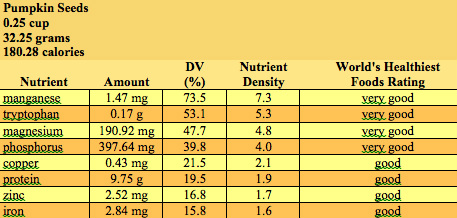|
By Haily Tran '16 For Brown students, fall usually means two things: lots of midterms and lots of pumpkins. While the classic pumpkin spice latte provides both caffeine and that warm, fuzzy fall feeling of “everything is going to be all right” during those miserable all-nighters in the library, it leaves out a little known stress-reducing agent found in this special member of the squash family. Pumpkin seeds are an overlooked natural source of Tryptophan, an essential amino acid that the body does not naturally produce. Tryptophan is the only amino acid that produces serotonin, a powerful neurotransmitter that experts in the field of neuroscience have linked with mood regulation (1). When activated by an internal or external stimulus, a neuron releases serotonin into its synapse, where the chemical signal is passed on to adjacent neurons. While the transmitted neural signals are responsible for the resulting mood change, the amount of serotonin released actually regulates how much we feel. Depression and anxiety have been linked to the brain not “feeling” enough (2). Researchers are still investigating the extent of serotonin’s effects on the brain. However, the majority agrees that elevated levels of serotonin reduce stress and improve sleeping and learning abilities – the golden combo to combat exam-induced stress and anxiety. Most people often seek the positive effects of Tryptophan in antidepressant medication or amino acid supplements. However, in 1989, the FDA recalled a large batch of L-Tryptophan, a Tryptophan supplement, because it was linked to Eosinophilia-Myalgia Syndrome (EMS), a rare, deadly flu-like condition (3). The sales of L-Tryptophan and other similar supplements were banned until 2008, even though the FDA was not able to determine whether or not EMS resulted from accidental contamination during production. Now, a few years after the ban was lifted, many consumers are still weary of the risks associated with pharmaceutical drugs due to potential contamination during production. Supplements labeled as “natural products” are synthesized in labs, thus making them vulnerable to mishaps such as contamination. With pumpkin seeds, however, you are guaranteed that ‘natural’ element, making them the superior method for ingesting a Tryptophan boost. Besides the delectable saltiness that makes them perfect as study snacks, your brain gets the building blocks it needs to synthesize more serotonin without your body taking in additional potentially harmful chemicals.  According to World’s Healthiest Foods.com, a quarter cup of dried pumpkin seeds contains 0.17g of Tryptophan, which is about 50% of the daily-recommended value. A three-quarter cup of this snack has as much tryptophan as one supplement pill (0.5g per tablet of L-Tryptophan). [image via] Even when pumpkin season is over, keep a stash of dried pumpkin seeds for the hard winter months. A healthy dose of pumpkin seeds whenever needed will keep the happy juices flowing to help combat December’s finals stress and chase away those January-February blues!
1 Comment
Sanjay
1/6/2023 08:52:16 am
Hi
Reply
Leave a Reply. |
